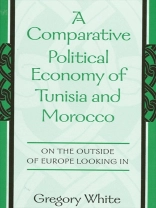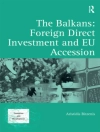Examines how rising economic integration with Europe impacts Tunisia and Morocco.
This book examines the profound impact of European integration on two North African countries, Tunisia and Morocco. Confronting the theoretical literatures on the ’entanglements’ of the domestic and international realms, and the intricate role played by the middle-income state in the international arena, White provides the first detailed comparison of Tunisia and Morocco’s post-independence political economies, especially in the context of the ’Euro-Mediterranean Partnerships’ signed with the European Union in the late 1990s.
North African states must act, on the one hand, as entrepreneurs seeking to encourage trade and attract foreign investment within the domestic economy, in the process of crafting foreign economic policy with the European Union. On the other hand, such states are constrained by domestic pressures such as imperatives to secure job creation and maintain internal security. Countries on the periphery are therefore faced with two distinct questions: first, how does a middle-income state balance its conflicting roles and manage its relations with a regional power; and second, how does the relationship with the outside world affect key domestic actors? Answering these questions is one of the primary challenges facing Tunisia and Morocco in the new decade.
Innehållsförteckning
Acknowledgments
Preface
Introduction
Part I: Theoretical Framework
Chapter 1 Middle-Income Countries and the Politics of Economic Change
Chapter 2 A Political Economy of Tunisia and Morocco
Part II: The International Realm and Maghribi Political Economy
Chapter 3 Euro-Maghribi Relations: The International Context of Maghribi Domestic Development
Chapter 4 Tunisia’s Infitah to Europe: The ’Tunisia Model’
Chapter 5 Morocco’s Deferred Adjustment
Part III: State-in-Society and State-in-the-International-Economy
Chapter 6 Who’s Winning? Tunisia and Morocco’s Competition for Partnership with the European Union
Notes
Bibliography
Index
Om författaren
Gregory White is Associate Professor of Government at Smith College.












